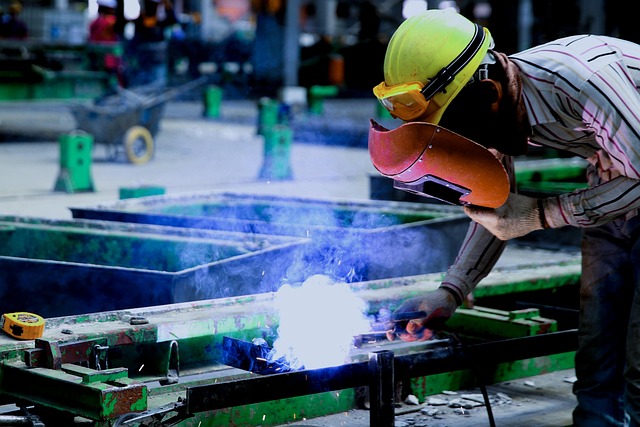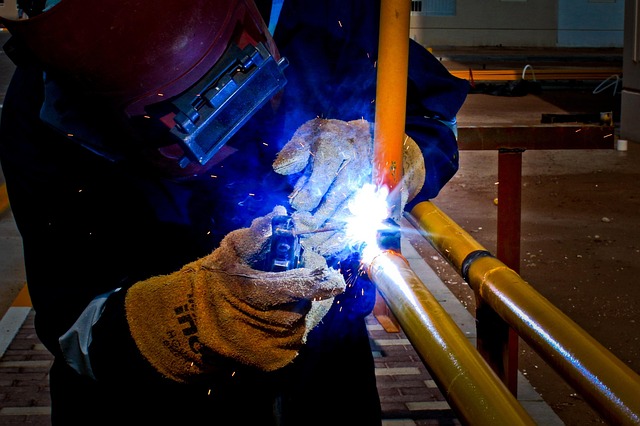Industrial property lending in Colorado is a specialized market supporting manufacturing, warehousing, and distribution with customized funding options from traditional and alternative lenders. Driven by aerospace, tech, and agriculture economies, strategic location, building condition, and layout are key evaluators for property value. E-commerce growth and logistical demands fuel a renaissance, offering developers and lenders opportunities while challenging them to adapt to vertical integration trends. Colorado's industrial sector benefits from flexible financing options, including equipment financing, and successful projects like adaptive warehouse re-use and eco-friendly factory renovations.
Industrial buildings are a cornerstone of Colorado’s thriving economy, driving innovation and growth across various sectors. This article explores the dynamic landscape of industrial property lending in Colorado, providing insights into key factors that influence real estate evaluations. We delve into market trends shaping the state’s industrial sector and outline financing options for property owners. Additionally, compelling case studies highlight successful industrial investments, offering practical lessons for aspiring investors. Discover how navigating industrial property lending can unlock lucrative opportunities within Colorado’s robust market.
- Understanding Industrial Property Lending in Colorado
- Key Factors for Evaluating Industrial Real Estate
- Market Trends Shaping Colorado's Industrial Landscape
- Financing Options for Industrial Property Owners
- Case Studies: Successful Industrial Investments in Colorado
Understanding Industrial Property Lending in Colorado

Industrial property lending in Colorado is a specialized sector within the broader real estate financing market, catering to the unique needs of businesses occupying or seeking to occupy industrial spaces. This type of lending involves funding for commercial properties designed for manufacturing, warehousing, distribution, and other related activities. The landscape of industrial property lending in Colorado is characterized by a mix of traditional banks, credit unions, and alternative lenders who recognize the economic significance of supporting local industries.
Colorado’s thriving economy, driven by sectors like aerospace, technology, and agriculture, creates a robust demand for industrial spaces. Lenders in this space offer various financing options, including long-term mortgages, lines of credit, and flexible loans tailored to accommodate the often-sophisticated needs of industrial businesses. The competitive nature of the market encourages lenders to provide customized solutions, leveraging advanced data analytics and risk assessment tools to facilitate efficient decision-making processes for both borrowers and lenders.
Key Factors for Evaluating Industrial Real Estate

When evaluating industrial real estate in Colorado, several key factors come into play for prospective buyers and investors. The location is paramount; proximity to transportation hubs, highways, and major cities can significantly impact a property’s value and accessibility for both goods and talent. Industrial properties in strategic locations often see higher demand, making them attractive investment opportunities.
Additionally, the condition and layout of the building are crucial considerations. Investors should assess the structural integrity, age, and maintenance history of industrial facilities to ensure they meet modern standards and can accommodate potential future expansions. The overall design and efficiency of the space, including clear heights, loading docks, and parking, directly influence operational costs and the facility’s ability to support various industrial activities, making these aspects vital for any industrial property lending in Colorado.
Market Trends Shaping Colorado's Industrial Landscape

Colorado’s industrial landscape is undergoing a significant transformation, driven by dynamic market trends that are reshaping the state’s real estate scene. The rise of e-commerce has fueled a surge in demand for logistics and distribution centers, pushing up the value of industrial property lending across Colorado. As online shopping becomes increasingly popular, businesses are expanding their warehousing and fulfillment operations to meet the changing consumer demands.
Additionally, the state’s thriving economy and strategic location between major metropolitan areas have made Colorado an attractive hub for manufacturing and production facilities. This influx has led to a competitive market for industrial property, with investors seeking lucrative opportunities. The trend towards vertical integration and efficient supply chain management further emphasizes the need for modern industrial spaces, presenting both challenges and opportunities for developers and lenders in this dynamic sector.
Financing Options for Industrial Property Owners

Industrial property owners in Colorado have several financing options available to support their business growth and expansion. Traditional bank loans remain a popular choice, offering competitive rates and flexible terms for qualified borrowers. Many financial institutions specialize in industrial property lending, providing customized solutions tailored to the unique needs of manufacturers, warehouses, and distribution centers.
Alternative financing methods, such as equipment financing and vendor leasing, are also viable options for Colorado’s industrial property owners. Equipment financing allows businesses to lease or finance specific machinery and equipment, enhancing their operational capabilities while spreading out payments over time. Vendor leasing provides a flexible arrangement where the vendor retains ownership of the equipment but allows the business to use it in exchange for regular rental payments, helping to improve cash flow management. These diverse financing options empower industrial property owners to navigate capital requirements efficiently and strategically.
Case Studies: Successful Industrial Investments in Colorado

Colorado has seen significant success stories in industrial investments, attracting investors with its robust economy and strategic location. One notable case involves a former warehouse in Denver that was transformed into a modern logistics center, benefiting from the city’s growing e-commerce sector. This project exemplifies how adaptive re-use of industrial property lending Colorado can drive economic growth.
Another successful example is a factory renovation in Fort Collins, where an outdated manufacturing facility was revitalized with sustainable practices and technology upgrades. This investment not only created local jobs but also reduced the plant’s environmental impact. Such transformations highlight the potential of industrial property lending Colorado to foster both economic development and sustainable practices within the region.
Colorado’s thriving industrial sector presents a lucrative landscape for investors and developers. By understanding the key factors that influence industrial real estate, staying informed about market trends, and exploring financing options tailored to this unique sector, individuals and businesses can navigate the complex world of industrial property lending in Colorado effectively. The case studies highlighted in this article demonstrate successful investments, offering valuable insights for those looking to enter or expand their presence in Colorado’s dynamic industrial market.
